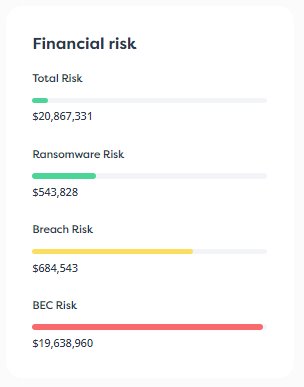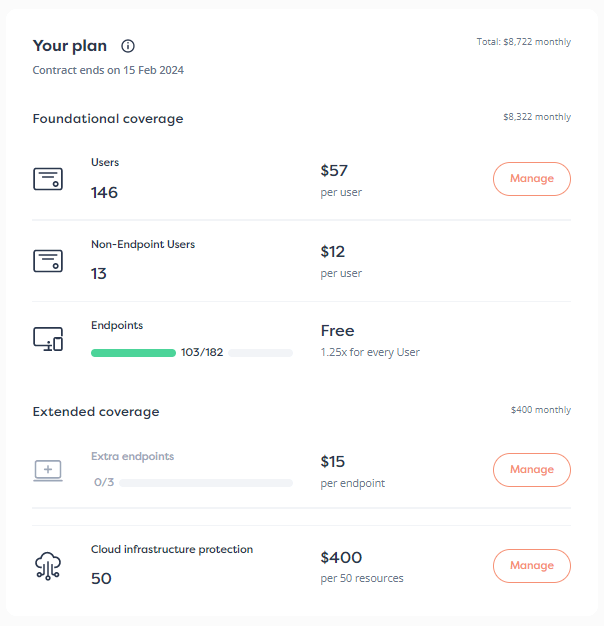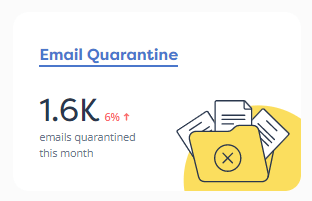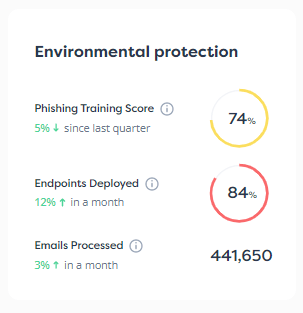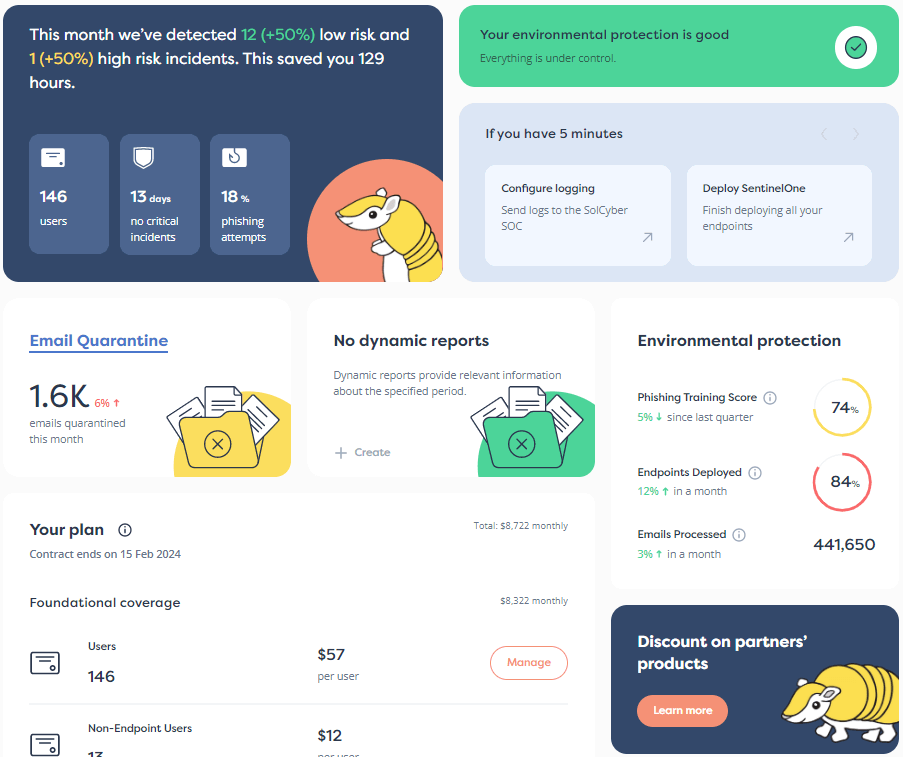

The cybersecurity vendor market is quite complicated and it’s easy to get lost in the acronym soup. Whether it’s to make their product sound different or just the proclivity of the tech industry to abbreviate everything, it can be incredibly challenging for non-security people to understand what’s important and what isn’t.
Making matters worse, many of the services overlap, meaning that you can invest in two “different” services or platforms and end up getting the same thing in both.
One abbreviation that comes up often is MSS—Managed Security Services (or, in rare cases, Managed Service Security).
Managed services for security is probably the most important concept to understand when looking for a security solution because a competent managed service provider can help you fill in a lot of the cybersecurity gaps you may be missing.
In this article, we’re going to dive into exactly what an MSS is, why managed security services are important and touch on some of the benefits of managed security services.
Managed Security Services refer to a managed cybersecurity service that handles every aspect of your company’s security needs so you don’t have to take on in-house staff, resources, or platforms to do it yourself.
You can use a managed security service either completely without in-house security support, or you can use it to fill any gaps in your own cyber resiliency program.
Some of the gaps managed security services fill are:
Several factors have combined to make it essential for companies to invest in managed services for security. These factors are:
Cyber incidents are no longer a matter of “if” but “when.” By taking the attitude that you will someday suffer a data breach, you can take the right actions to avoid sensitive data loss or to properly mitigate any reputational fallout from the breach.
Attack prevention is a start, but it isn’t the entire picture. Companies must understand that the threat landscape, their attack surfaces, and their compliance requirements are all elements that can change often. The only way to keep a finger on the pulse is through constant monitoring using the right tools.
Additionally, organizations should have proactive tools and measures in place that can spot an ongoing threat via network anomaly detection or behavior-based indicators. Failure to properly identify and respond to a security event could lead to financial and reputational devastation.
Continuously monitoring a network to achieve this level of cyber resiliency is challenging, to say the least. However, managed detection and response providers can shore up any gaps in your ability to monitor your network by using managed cybersecurity solutions.
While cost-saving is one of the key benefits, MSS cyber security providers also offer other important benefits such as:
The first and foremost benefit of managed security as a service is the increased cyber resilience that your company achieves.
An MSS will use cutting-edge tools that are often out of the price range of many businesses. These tools can include Security Information and Event Management (SIEM) systems (a tool to monitor data from multiple services), next-generation firewalls, and advanced endpoint protection platforms. The MSS must also keep these tools updated with the latest features to provide its service to multiple clients.
An MSS provides ongoing support before, during, and after a security incident, using dedicated security analysts and professionals.
Network monitoring tools and comprehensive threat intelligence platforms significantly reduce the impact that any data breach might have.
How you respond to an incident is as important as preventing the incident in the first place. When the dust settles, you’ll need to take stock of what happened—and often provide detailed forensics reports to regulators so they can establish what penalties apply (if any).
Regulators put immense value on how a company responds to an incident. Equally important, companies that respond slowly suffer far more financial damage.
A security operations center (SOC) is a key element in responding quickly—and effectively—to any cybersecurity incident. A SOC refers to a 24/7 unit of dedicated professionals using the latest software and tools to enable a rapid response to any security incident. Having an in-house SOC is a major expense for most organizations, but a managed security service can bring this to the table.
Another benefit of using an MSS is their real-time threat detection and automated incident response platforms enable swift reaction. However, when relying on automated actions, it’s vital to have a human monitor available to veto any erroneous automated feedback—all of which an MSS provides.
Because managed security service providers use economies of scale, they can offer you higher quality security at a more affordable cost than you could provide for yourself.
Developing a strong cybersecurity function requires hiring multiple security analysts, investing in several tools, and ensuring both run 24/7. An MSS can divide those costs among clients and thus provide top-grade resources at a fraction of the price.
For companies that already outsource their cybersecurity services, working with multiple vendors can lead to complications, because vendor services can overlap and sometimes even conflict.
Yet, using multiple cybersecurity solutions and tools is often an unfortunate requirement these days due to the sheer quantity of security sectors and areas of expertise required for complete cyber resiliency.
A managed cybersecurity service decreases your vendors from many to one, thus reducing the complications and significantly simplifying operations—not to mention the fact that you only have to pay a single invoice each month.
Without an MSS in place, your company might hit a bottleneck as it tries to scale because of the strain being put on your in-house team. A struggling in-house team results in more than “not scaling”—it can lead to potentially devastating data breaches because all your security fundamentals aren’t in place as you capture larger and larger segments of the market.
An MSS scales with you because it’s already built to handle sudden spikes as its customers grow.
As governments roll out laws to protect privacy and reduce cyberattacks, compliance grows ever more complex.
A managed security services provider can help you navigate this mire of complexity and ensure that you’re in compliance even as new requirements emerge.
Here’s a short breakdown of the types of managed cybersecurity services you can invest in:
Endpoint detection and response (EDR) is a suite of tools and solutions that monitor your endpoints (any device connected to an external network such as the internet) looking for anomalies, and then responding when those anomalies occur. For severe threats, the responses often require manual intervention, which is when MDR—managed detection and response—steps in.
MDR also takes a proactive approach to the detection aspect, with periodic inspections by humans to ensure the EDR tools are running correctly.
XDR has varying definitions in the industry but typically signifies a more comprehensive version of MDR. For example, XDR typically includes aggregated data from multiple data sources to bring additional insight into the managed detection service.
An MSSP is a company that provides managed security services but usually focuses only on the managed detection piece.
Unfortunately, MSSPs typically don’t take an active role in helping you respond to data breaches. They simply alert your in-house or outsourced cybersecurity team when an incident occurs.
A modern MSSP like SolCyber provides fully managed cybersecurity services, including detection, response, and remediation. This concept has been lacking in the security industry, even though it’s typically what people think of when they hear, “managed security services.”
This is not a cybersecurity term, but we’ve included it here because people often confuse the terms—or mistakenly expect the MSP to provide MSSP services. MSPs don’t typically offer comprehensive cybersecurity services. When they do, it’s usually as part of a partnership with a modern MSSP.
No “perfect choice” exists when choosing a managed security provider. Also, your final decision depends greatly on your organization’s specific needs. That said, we recommend considering the following two factors:
Once you’ve established answers to those questions, look at the following three factors:
Before signing on, have frank and candid conversations with your potential partner regarding the above. If their answers don’t satisfy you, then we recommend you look elsewhere.
Fortunately, finding the right partner will signify a major step as you scale your business securely and compliantly.
To learn more about SolCyber’s modern managed security services, check out our solutions page here.


By subscribing you agree to our Privacy Policy and provide consent to receive updates from our company.


